七上unit5知识点总结
人教版七年级上册英语知识点全第五单元unit5知识点

Unit 5谈论物品所属关系。
1、重点辞汇:do、have、tennis、ping-pong bat、soccer、volleyball、basketball、play、interesting、boring、fun、difficult、relaxing、watch、same...2、soccer ball(英式)足球 a tennis bat一个网球拍baseball bat 棒球拍be late 迟到watch TV 看电视on TV 在电视上play basketball 打篮球play sports 做运动或参加体育比赛3、含有实意动词的一般疑问句的结构及答语。
---Do you /they have a...? e.g. Do they have a basketball?---Yes,I/they do./No,I/they don’t.---Does he /she have a...? e.g. Does she have a new schoolbag?---Yes,he/she does./No,he/she doesn’t.( )----Do you have lunch at home?----___________.A. Yes, I amB. Yes, I canC. Yes, I doD. Yes, I have4、tennis 和tennis ball的区别:tennis指运动项目名称,即“网球运动”。
tennis ball 则指具体的球,有单、复数之分。
e.g. a tennis ball/some tennis balls五、一般此刻时中have的用法和与there be 句型的辨析;have “有”即某物属于某人,表示所属关系,三单形式为has.e.g. I have a blue jacket and my sister has a yellow one.there be “有”主要指的是某地存在某物。
Unit 5 知识归纳人教版英语七年级上册

Name: ________ Class:______Unit 5 知识归纳一、重点短语。
1.play basketball 打篮球2.play soccer/football 踢足球3.play volleyball打排球4.tennis racket网球拍5.baseball bat棒球棒6.ping-pong bat乒乓球拍7.be late for school上学迟到8.Let’s go! 我们走吧!9.Let me get it. 让我去取吧。
10.L et’s watch TV. 让我们看电视吧。
11.go home 回家12.That sounds interesting/ relaxing/boring/ difficult/good/ great.那听起来很有趣/放松/无聊/困难/不错。
13.go to the same school 上同一所学校14.in different classes 在不同的班级15.at school/ at home在学校/在家16.play with friends 和朋友一起玩17.watch them on TV 在电视上看他们18.It is adj. for sb. to do sth.= Doing sth. isadj. for sb. 做某事对某人来说怎么样19.课后/课前/课中after class/beforeclass/in class20.在教室里in the classroom21.p lay computer games 玩电脑游戏22.p lay/do/have sports 做运动三、作文范文。
My name is Gina. I like doing sports. It is interesting for me.I have eight tennis balls, two volleyballs and five soccer balls, but I don’t have a baseball. I have a good friend Jack. We are in the same school. He has a ping-pong ball and two ping-pong bats. After school, he can play it with his classmates. He thinks it’s relaxing. He likes basketball very much. But he only watches it on TV. It’s difficult.It’s time for sports. Let’s play soccer. Come on!。
(译林版) 2024七年级上册Unit5知识点梳理背诵

(译林版) 2024七上Unit 5知识点梳理背诵Welcome to the unit1. good and bad points of different lifestyles 不同生活方式的优点和缺点2.a healthy lifestyle (比较级healthier/否定unhealthy) 一个健康的生活方式3. A life without health is like a river without water. 不健康的生活犹如干涸的河流。
(be like / be similar to)4.It's healthy for us to have milk and eggs often. 经常喝牛奶吃鸡蛋对我们很健康。
5.Fish is good for our health.(n.健康) 鱼对我们健康有好处。
Carrots are good for our eyes. 胡萝卜对我们的眼睛有好处。
6.What else =what other things 别的东西7. Me too=I share the same idea with you. 我也是和你一样。
8. learn how to have a healthy lifestylehow to do sth./ what to do next9.live a happy life 过着快乐的生活比较:live in a big house10.What other foods do you know? 你知道其他什么食物?Reading一、重点词组1.what we eat/ do /see 我们吃什么/做什么/看什么2.how we live 我们生活的方式3.dance for half an hour 跳舞半小时.4. get nine hours of sleep 获得9小时的睡眠5. be full of energy 精力充沛6. go to school without breakfast 不吃早饭上学7. have a sweet tooth 爱吃甜食8. stay up late (late即是形容词也是副词) 熬夜很晚9. say no to cakes 对蛋糕说不(拒绝蛋糕)10.need to get enough sleep/have a good sleep 需要获得充足的睡眠/好的睡眠11.plan to go swimming 计划去游泳12.change his unhealthy lifestyle 改变他的不健康的生活13. give us energy for the morning 给我早上提供能量方式14. do some exercise 做一些锻炼15. go for a walk everyday to get enough exercise 每天去散步,进行充足的锻炼do morning /eye exercises 做早操/做眼保健操二、重点句型1. It is important for me to keep fit.对我来说保持健康很重要。
七年级英语上册unit5知识点总结
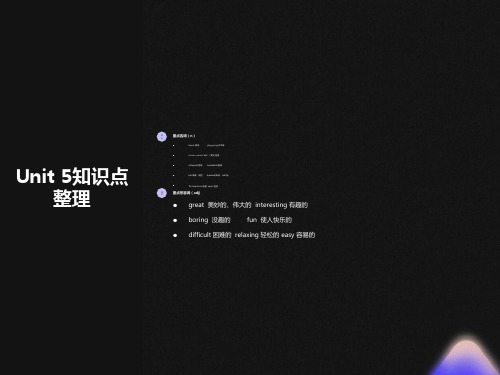
2、A:Let’s play basketball!
让我们去打篮球吧! B:That sounds good/interesting. 那听起来不错/是有趣的!
play+球类运动 玩/打……球类
eg:play ping-pong 打乒乓球 play tennis ball 打网球
I don’t have a soccer ball,but my brother Alan does.
eg:Math is difficult for Jenny. 数学对于Jenny来说是困难的。
英语对于他来说是有趣的。
01
它对于我来说是容易的。 after class 课后 after school 放学后
02
1、Let sb do sth 让某人做某事 注:sb为人称代词的宾格 do为动词原形 eg: Let us go =let’s go 让我们一起走 Let us play=Let’s play 让我们一起玩 Let us ask=Let’s ask 让我们一起去 问 Let me get it. 让我去取它 Let them play ping-pong ball.
01
02
Unit 5知识点整理
三、实义动词have的各种句型变法
结构为:Do/Does+主+have+其它? 肯回: Yes,主+do/does 否回:No,主+don’t/doesn’t
01
02
01
02
eg:1、I have a baseball.
四、重点句式、短语
我没有一个足球,但我的兄弟Alan有。
eg:I h5、go to the same school. 去相同的学校 6、with 介词 和……一起 and 连词 和 eg: My classmates and I play ping-pong. 我的同班同学和我打乒乓球。 I play ping-pong with my classmates. 我打乒乓球和我的同班同学。 7、Sth+be+形容词+for+sb 某物对于某人来说是……样的
七年级上Unit 5 Visiting the Moon知识点
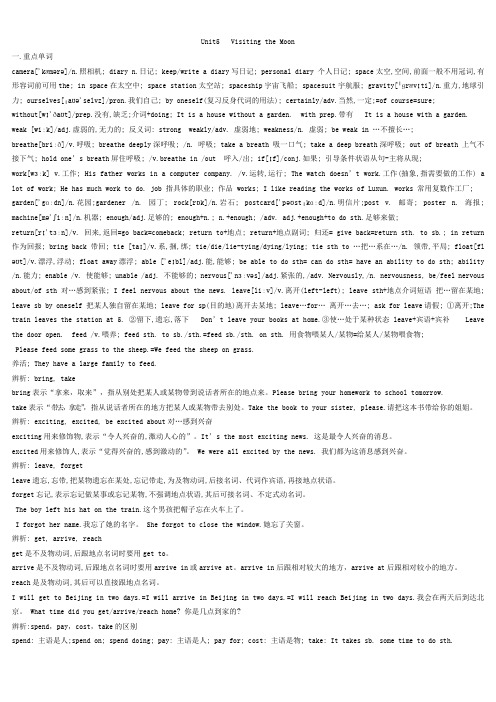
Unit5 Visiting the Moon一.重点单词camera['kæmərə]/n.照相机; diary n.日记; keep/write a diary写日记; personal diary 个人日记; space太空,空间,前面一般不用冠词,有形容词前可用the; in space在太空中; space station太空站; spaceship宇宙飞船; spacesuit宇航服; gravity[ˈɡrævɪti]/n.重力,地球引力; ourselves[ˌaʊə'selvz]/pron.我们自己; by oneself(复习反身代词的用法); certainly/adv.当然,一定;=of course=sure;without[wɪ'ðaʊt]/prep.没有,缺乏;介词+doing; It is a house without a garden. with prep.带有 It is a house with a garden. weak [wiːk]/adj.虚弱的,无力的; 反义词: strong weakly/adv. 虚弱地; weakness/n. 虚弱; be weak in …不擅长…;breathe[briːð]/v.呼吸; breathe deeply深呼吸; /n. 呼吸; take a breath 吸一口气; take a deep breath深呼吸; out of breath 上气不接下气; hold one’s breath屏住呼吸; /v.breathe in /out 呼入/出; if[ɪf]/conj.如果; 引导条件状语从句-主将从现;work[wɜːk] v.工作; His father works in a computer company. /v.运转,运行; The watch doesn’t work.工作(抽象,指需要做的工作) a lot of work; He has much work to do. job 指具体的职业; 作品 works; I like reading the works of Luxun. works 常用复数作工厂; garden['gɑːdn]/n.花园;gardener /n. 园丁; rock[rɒk]/n.岩石; postcard['pəʊstˌkɑːd]/n.明信片;post v. 邮寄; poster n. 海报; machine[mə'ʃiːn]/n.机器; enough/adj.足够的; enough+n.; n.+enough; /adv. adj.+enough+to do sth.足够来做;return[rɪ'tɜːn]/v. 回来,返回=go back=comeback; return to+地点; return+地点副词; 归还= give back=return sth. to sb.; in return 作为回报; bring back 带回; tie [taɪ]/v.系,捆,绑; tie/die/lie-tying/dying/lying; tie sth to …把…系在…/n. 领带,平局; float[fl əʊt]/v.漂浮,浮动; float away漂浮; able ['eɪbl]/adj.能,能够; be able to do sth= can do sth= have an ability to do sth; ability /n.能力; enable /v. 使能够; unable /adj. 不能够的; nervous['nɜːvəs]/adj.紧张的,/adv. Nervously,/n. nervousness, be/feel nervous about/of sth 对…感到紧张; I feel nervous about the news. leave[liːv]/v.离开(left-left); leave sth+地点介词短语把…留在某地; leave sb by oneself 把某人独自留在某地; leave for sp(目的地)离开去某地; leave…for… 离开…去…; ask for leave请假; ①离开;The train leaves the station at 5. ②留下,遗忘,落下Don’t leave your books at home.③使…处于某种状态 leave+宾语+宾补 Leave the door open. feed /v.喂养; feed sth. to sb./sth.=feed sb./sth. on sth. 用食物喂某人/某物=给某人/某物喂食物;Please feed some grass to the sheep.=We feed the sheep on grass.养活; They have a large family to feed.辨析: bring, takebring表示“拿来,取来”,指从别处把某人或某物带到说话者所在的地点来。
七年级英语上册unit5知识点
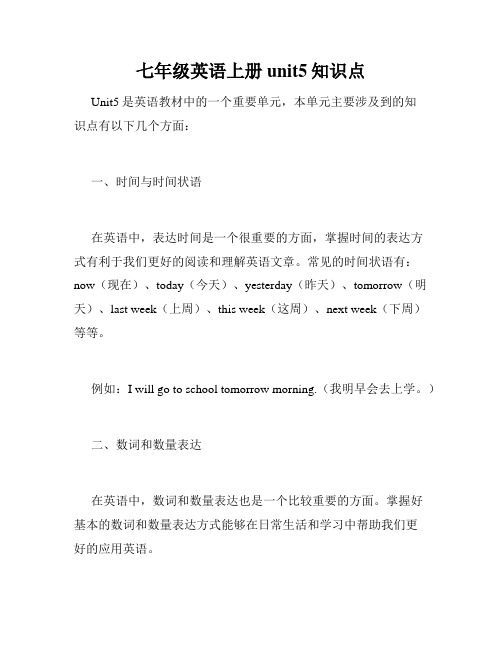
七年级英语上册unit5知识点Unit5是英语教材中的一个重要单元,本单元主要涉及到的知识点有以下几个方面:一、时间与时间状语在英语中,表达时间是一个很重要的方面,掌握时间的表达方式有利于我们更好的阅读和理解英语文章。
常见的时间状语有:now(现在)、today(今天)、yesterday(昨天)、tomorrow(明天)、last week(上周)、this week(这周)、next week(下周)等等。
例如:I will go to school tomorrow morning.(我明早会去上学。
)二、数词和数量表达在英语中,数词和数量表达也是一个比较重要的方面。
掌握好基本的数词和数量表达方式能够在日常生活和学习中帮助我们更好的应用英语。
常见的数词有:one(一个)、two(两个)、three(三个)、four(四个)等等。
常用的数量表达方式有:a few(一些)、many(许多)、a lot of(很多)等等。
例如:I have two brothers and three sisters.(我有两个兄弟和三个姐妹。
)三、情态动词情态动词在英语语法中被称为“Modal verbs”,主要表示说话人对所述情况的态度、看法或建议等等。
常见的情态动词有:can (能够)、could(可以)、may(可以)、might(可能)、must (必须)、should(应该)、will(将会)等等。
例如:You can borrow my bike if you want to.(你如果想的话可以借用我的自行车。
)四、被动语态被动语态在英语语法中被称为“Passive Voice”,在英语中非常常用。
它主要强调的是动作的被动形式,即动作发生的对象而不是动作的主语。
它的一般形式是:be+过去分词。
例如:The book was written by Tom.(这本书是汤姆写的。
)五、情感动词情感动词在英语语法中被称为“Verb of Emotion”,它强调的是说话人的感觉或情感。
人教版七年级英语上册Unit5短语、句型、知识点总结
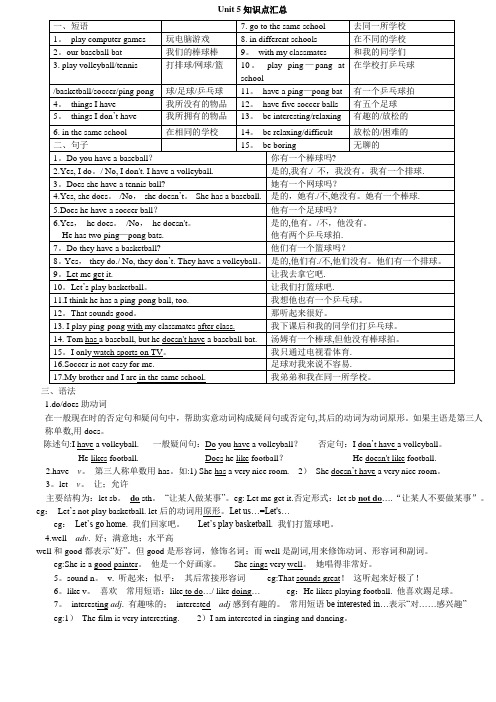
Unit 5知识点汇总三、语法1.do/does助动词在一般现在时的否定句和疑问句中,帮助实意动词构成疑问句或否定句,其后的动词为动词原形。
如果主语是第三人称单数,用does。
陈述句:I have a volleyball. 一般疑问句:Do you have a volleyball?否定句:I don’t have a volleyball。
He likes football. Does he like football?He doesn't like football.2.have v。
第三人称单数用has。
如:1) She has a very nice room. 2)She doesn’t have a very nice room。
3。
let v。
让;允许主要结构为:let sb。
do sth。
“让某人做某事”。
eg: Let me get it.否定形式:let sb not do….“让某人不要做某事”。
eg:Let’s not play basketball. let后的动词用原形。
Let us…=Let's…eg:Let’s go home. 我们回家吧。
Let’s play basketball. 我们打篮球吧。
4.well adv. 好;满意地;水平高well和good都表示“好”。
但good是形容词,修饰名词;而well是副词,用来修饰动词、形容词和副词。
eg:She is a good painter。
他是一个好画家。
She sings very well。
她唱得非常好。
5。
sound n。
v. 听起来;似乎:其后常接形容词eg:That sounds great!这听起来好极了!6。
like v。
喜欢常用短语:like to do…/ like doing…eg:He likes playing football. 他喜欢踢足球。
7。
interesting adj. 有趣味的;interested adj感到有趣的。
人教版英语七年级上册Unit5知识点总结
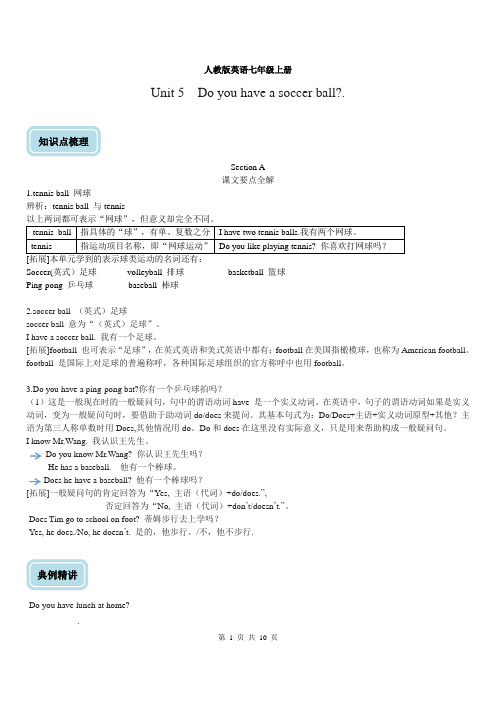
人教版英语七年级上册Unit 5 Do you have a soccer ball?.知识点梳理Section A课文要点全解1.tennis ball 网球辨析:tennis ball 与tennis以上两词都可表示“网球”,但意义却完全不同。
[拓展]本单元学到的表示球类运动的名词还有:Soccer(英式)足球volleyball 排球basketball 篮球Ping-pong 乒乓球baseball 棒球2.soccer ball (英式)足球soccer ball 意为“(英式)足球”。
I have a soccer ball. 我有一个足球。
[拓展]football 也可表示“足球”,在英式英语和美式英语中都有;football在美国指橄榄球,也称为American football。
football 是国际上对足球的普遍称呼,各种国际足球组织的官方称呼中也用football。
3.Do you have a ping-pong bat?你有一个乒乓球拍吗?(1)这是一般现在时的一般疑问句,句中的谓语动词have 是一个实义动词。
在英语中,句子的谓语动词如果是实义动词,变为一般疑问句时,要借助于助动词do/does来提问。
其基本句式为:Do/Does+主语+实义动词原型+其他?主语为第三人称单数时用Does,其他情况用do。
Do和does在这里没有实际意义,只是用来帮助构成一般疑问句。
I know Mr.Wang. 我认识王先生。
Do you know Mr.Wang? 你认识王先生吗?He has a baseball. 他有一个棒球。
Does he have a baseball? 他有一个棒球吗?[拓展]一般疑问句的肯定回答为“Yes, 主语(代词)+do/does.”,否定回答为“No, 主语(代词)+don’t/doesn’t.”。
-Does Tim go to school on foot? 蒂姆步行去上学吗?-Yes, he does./No, he doesn’t. 是的,他步行。
- 1、下载文档前请自行甄别文档内容的完整性,平台不提供额外的编辑、内容补充、找答案等附加服务。
- 2、"仅部分预览"的文档,不可在线预览部分如存在完整性等问题,可反馈申请退款(可完整预览的文档不适用该条件!)。
- 3、如文档侵犯您的权益,请联系客服反馈,我们会尽快为您处理(人工客服工作时间:9:00-18:30)。
Unit 5单元知识总结1、做运动do/play sportssport这个词比较特殊,用来修饰其他物品时需要用复数形式sports运动鞋____________ sports T-shirt________sports collection________体育用品2、各项运动basketballbaseballvolleyballplay football足球网球羽毛球()I like to play __________.A.a basketballB. the basketballC. soccer ballD.tennis3、Let’s go!Let’s 是let us 的缩写,表示“让我们····吧”,用于提出建议或征求别人的意见。
Let 后面要用人称代词的宾格,并且加动词原形。
()Let’s _______ for a walk!A.to go B, going C.go D.gone()Let it _________.A, is B, am C,are D,be()Let the cats ________ on the desk.A./B. isC. beD.are()Let_________go!A.sheB.hisC.weD.them4、We are late!be late 表示迟到,注意人称和be动词的搭配。
Jane _______ late.You _______ late.be late for sth. 表示“做什么迟到”. 上学迟到_________________5、That sound s good!听起来很棒!=Sounds good!=It sounds good!sound”听起来···”后面可以加形容词如interesting, fun, nice, great, boring, difficult, easy等。
( )-----Let’s play computer games!-----__________interesting!A, It sound B. That sound C. Sounds D Sound6、interesting, fun, nice, great, boring, difficult, easy,relaxing等形容词即可做表语,也可以做定语。
( )This is an__________ game. I like it.A, boring B. fun C. difficult D, interesting( )I think it is__________. I don’t like it.A, nice B, relaxing C. boring D,fun7、I don’t have a soccer ball but my brother Alan does. 这是一个省略句,用does 代替了has a soccer ball,以避免重复。
英语中经常用到用be,动词和助动词do/does替代的省略句,一定要注意人称。
I am not a girl but Gina ________.I am beautiful but Helen ____________.Victor has two books but Cindy______________.My sister ________tidy but my brother ______________.Mars likes to play basketball but Sophia _______________.Miss Liu doesn’t play ping-pong well but Wang Qing and Yuang Hongliang ____________.They love English but I _________________.8、We go to the same school and we love soccer.我们去同一所学校,并且我们都爱足球。
same,”相同的”,用来修饰名词时前面必须加定冠词the, 如the same class, the same teacher等。
9、We play it at school with our friends.at school,”在学校”play sth. with sb.和某人一起玩什么With是一个介词,意为“和····一起;带有;使用”( )I go to school ___________ my friends.A.andB.with C, but( )There is a house _______ a green tree.A, in B,have C,with( )I write ________ a pen.eB.withC.on10、I only watch them on TV.only仅仅,只watch TV 看电视watch sth on TV 在电视上看···(注意watch的三单形式加es)( )I like to watch soccer game ___________ TV.A, in B, at C,on11、It is easy for me!它对我来说很容易It is +adj. for sb. To do sth. 做某事对某人来说是···的( )Math is difficult ________ me, but I can learn it well.A,at B, of C,for( )It’s relaxing ____________ her ________ basketball.A,for, to play B, of, play C, for, play12、After class, I play ping-pong with my classmates.after, 介词“在···之后”after school, after class同班同学_________ 校友___________室友___________同桌____________ 13、I love sports, but I don’t play them. I like ping-pong.love“爱,喜爱”;like “喜欢”,这两个动词在使用时要注意!喜欢做某事like to do sth. like doing sth.爱做某事love to do sth. love doing sth.这种加(to do)或者(doing)的动词短语还有很多,同学们在学习时要注意总结。
比如ask sb. to do sth.要求(让、叫)某人做某事翻译:我喜欢打篮球。
Tom爱好玩电脑游戏。
我认为他不喜欢和朋友们一起踢足球。
14、实意动词的一般疑问句、特殊疑问句及三单变化详见专项练习。
一、一般疑问句1.当主语是I(We)you,they时,直接在首句加____.2. 当主语是三单(he, she,it)时,直接在首句加_____.3. 但v(动词)用原型。
二、回答问题和否定句1. 主语是I(We)you,they时,需借助_____.2. 主语是三单(he, she,it)时,需借助_______.习题:用do,does, don't 和doesn't 填空---- You have a soccer ball?-----Yes, I ______.----_______Dave have a tennis racket?----No, he ______.______your sister have a volleyball?Yes, she ______.________they have a new TV?Yes, they______.______your brother have a volleyball?No, he ______.Does he _____a soocer ball?Yes, he ______.________your friends have a baseball?No, they_____a basketball.二、肯定句1.当主语是I(We)you,they时,动词用原型(have).2. 当主语是三单(he, she,it)时,动词用三单(has).3. 但v(动词)用原型。
eg. 我有一本书。
他有一个哥哥。
三、否定句1. 主语是I(We)you,they时,需借助don't.2. 主语是三单(he, she,it)时,需借助doesn't.eg. 我们没有钥匙。
她没有书包。
他没有找到钥匙练习:一、用have 和has ,don’t, doesn’t填空1. I _____ a book and he _____ a pen.2. They _____ a color TV. They _____ havea computer.3. She ____ a sister. He _____ a brother.4. I _____ have computer. Tom _____ one.5. Does he ________ a computer?No, he _________.6. -- Do you _________ a backpack?-- Yes, I _______.7. -- Does she ________ a ruler.-- Yes, she ________.8. Mary _____a tennis bat, but she doesn't _______a tennis ball.9. I ______have a book, but I have a pen.10. We ________story books. He ________ones, too.11. My classmates _______a volleyball, but they have a soccer ball.三、根据句意和提示填空。
1. -- Let’s _________________(踢足球).-- That sounds ____________(很有趣).2. -- Let’s play basketball.-- I ____________ (没有)a basketball.-- Let’s play ping-pong.-- ________________ (那太好了).3. -- _____ you _______ (你有) a baseball bat?-- No, I don’t.-- Let’s ___________ (看电视).-- That sounds _________ (没意思).。
